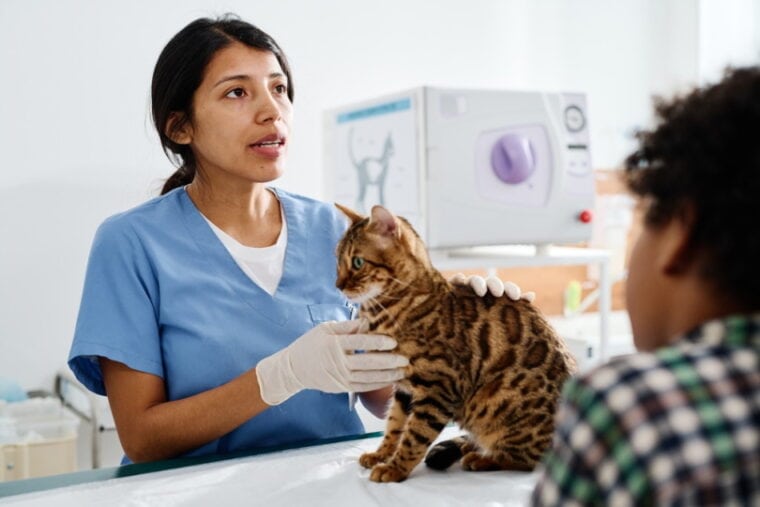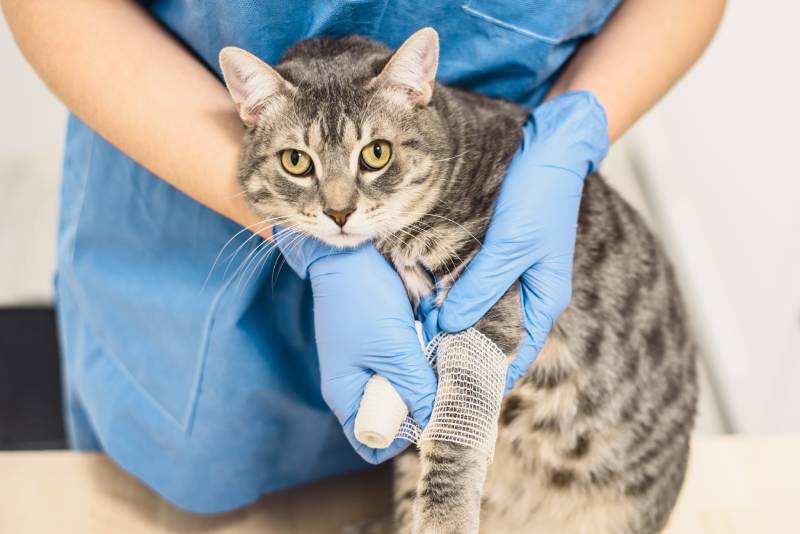
Bringing home a kitten or cat is an exciting time for any pet owner. One of the first things you’ll likely do after you bring your pet home is take it to the vet for its first checkup. That first visit may have you wondering: just how often does a new cat or kitten need to visit the vet anyway?
Kittens need to go to the vet more often during the first year of their life, but many adult cats only need an annual wellness checkup. Once your cat is past their prime adult years, senior and geriatric cats may need to see the vet more often as they deal with the issues relating to declining health as they age.
Figuring out how often you need to take your cat to the vet can be overwhelming, so we’ve broken down how often your cat may need to visit the vet based on their life stage. Read on to learn more about the life stages of cats, some potential health issues during each stage, and how often they’ll need to see the vet as they age.
Vet Care for Cat Life Stages
Kittens
Kittens need several visits during their early months of life, usually starting around six to eight weeks of age until they’re roughly 16–20 weeks of age.
During these early visits, your kitten is given a series of vaccines to prevent a variety of illnesses.
Kittens can reproduce as young as four months of age, so it will be important to get your cat neutered or spayed during its first four to six months to prevent unwanted pregnancies. If you’ve adopted your pet from a shelter, make sure to get your cat’s veterinary care records from the shelter to give to your vet to avoid over-vaccination.

Adult Cats
Many vets recommend a yearly annual wellness exam for adult cats, starting from age one until about eight years old. Your vet will check for common health ailments that can affect adult cats, such as parasites, digestive issues, obesity, and dental disease. They will also check for eye, ear, and heart issues to make sure that your cat is as healthy as possible. Your cat may also need vaccine boosters at their yearly visit.
During your cat’s vet visit, make sure to bring up any health or behavior issues that your cat may be experiencing. Our cats can’t speak for themselves (at least not in a language that the vet can understand easily), so it will be important for you to mention any mobility issues, strange behaviors, etc.—as these may be indicative of a larger health issue.
Senior Cats
Cats are typically considered seniors starting around the age of eight through 15 years. Cats will still need an annual wellness exam and the occasional vaccine booster, but they may also need to see a vet more often as they age. Obesity, diabetes, dental disease, loss of eyesight or vision, kidney disease, cancer, or arthritis are all illnesses that affect senior cats.
During these years, many cats start to exhibit signs of arthritis1, such as issues stepping into their litter box or jumping up on couches or the bed. Speak to your vet about any mobility or other issues so they can properly monitor your cat and provide appropriate treatment as needed.

Geriatric Cats
Cats are considered geriatric starting around age 15 until about 20 years. Many cats start to experience some sort of illness during these years, so they may need to see the vet every few months depending on their health. Arthritis may develop or worsen as your pet hits its golden years. If you’re noticing signs of arthritis, such as litter box avoidance, talk to your vet about medication to help your cat manage the pain.
Other health issues that may impact your geriatric cat are vision and hearing loss, weight loss due to illness, tooth loss due to dental disease, mental confusion, or trouble grooming themselves. As your pet enters these twilight years, make note of any concerning health issues so you can discuss them with your vet.
Quality of life is important during your pet’s senior years and keeping a record of health concerns will help you make the difficult decision when it’s time to say goodbye.
How to Tell if Your Cat Is Sick
Here are some symptoms that may indict your cat is sick and needs to see a vet2:
Conclusion
While how many vet visits our cats need throughout their life varies greatly based upon age, it can’t be denied that routine vet care allows issues to be addressed as they arise, often resulting in lifesaving preventative care.
Starting from the time they are kittens through the end-of-life care for geriatric cats, veterinarians help cat owners ensure their beloved felines stay healthy through the years. Keeping our cats healthy through routine wellness checks, vaccinations, and spaying/neutering help to guarantee a long and healthy life for our feline friends.
Featured Image Credit: Pressmaster, Shutterstock







